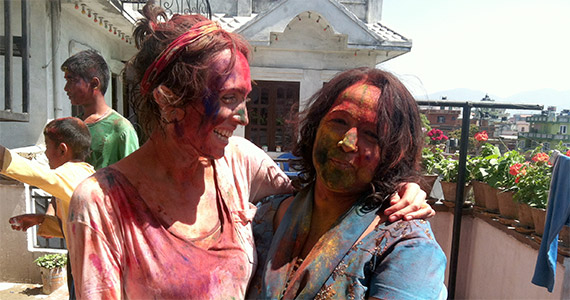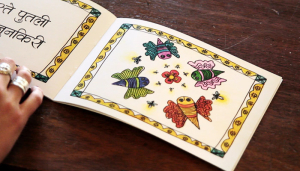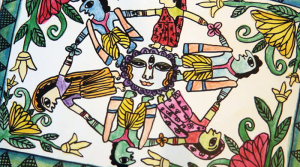
Meridith Burchiel ‘ 14 always enjoyed a good book, but she never imagined returning from a semester in Nepal having written, illustrated, and published her own in a language she had never spoken before.
An art major from Portland, Oregon, Burchiel arrived in Nepal last spring with 11 other 5C students as part of the Pitzer in Nepal program. Within two months, Burchiel was proficient in Nepali.
“There’s no other time in my life when I would have the opportunity to learn the language and be let into these tiny circles of culture,” she says. “When the reward of learning something new is to make a genuine heartfelt connection with someone, like I did with my host mom and teachers, there’s nothing that can motivate you more than developing a love with someone and having that be the incentive to keep learning.”
As Burchiel began to understand and participate in the Nepali culture, she was struck by the absence of books in her community. Instead, she met Nepali men who could recite classical poetry but couldn’t write their own name.
 Burchiel began to realize that this very oral culture was a result of the influx of modern technology; before books took hold in the culture it became a status symbol for households to have a television – even while maintaining traditions like eating meals on the mud floor.
Burchiel began to realize that this very oral culture was a result of the influx of modern technology; before books took hold in the culture it became a status symbol for households to have a television – even while maintaining traditions like eating meals on the mud floor.
“It was this huge jump from traditional oral storytelling and passing on information that way and then immediately to this media-driven consciousness,” Burchiel says. In addition, the over 120 languages spoken in Nepal made the creation of one national literature difficult.
Burchiel soon became familiar with another form of storytelling prevalent in Nepal: Mithila. Mithila is a stylistic painting method passed down from mothers to daughters – a special thing shared by women – and depicts the story of their village.
Interested in Mithila and the popularity of poetry in Nepal, Burchiel began writing a children’s rhyme that she illustrated same style. She read this goodnight poem, loosely based on Goodnight Moon, to her four-year-old host sister, who would request, “Read it again!”
Burchiel made the story as relatable as possible, incorporating little details from her village in Kathmandu valley into her writing and illustration. Burchiel named the book Namaste Joon, which translates to “Namaste to the Moon,” because “in south Asia many people say Namaste, which means the goodness in me honors the goodness in you,” she says. “It’s this very special moment… not only good manners but sharing your spirit for a second.”
 One afternoon, as part of Burchiel’s independent project about the facilitation of a reading culture through children’s literature, she met with a publisher for her research. When she mentioned the children’s poem she was working on, they wanted to publish it because there are so few children’s books in Nepali.
One afternoon, as part of Burchiel’s independent project about the facilitation of a reading culture through children’s literature, she met with a publisher for her research. When she mentioned the children’s poem she was working on, they wanted to publish it because there are so few children’s books in Nepali.
With three weeks left in Nepal, Burchiel finished the poem and illustrations and worked with the publishers to print the book in a manner that would keep it affordable and accessible for Nepali youth.
“We printed the 2,000 copies in a size and format that only uses one piece of paper,” Burchiel says. “Usually children’s books in color are 150-200 rupees, and we made mine to be 50 rupees.”
For Burchiel, the experience of the poem she had read to her little host sister becoming a book was surreal.
“It wasn’t about being published,” she says. “It was an afterthought that I realized I’m doing something I always wanted to do, so much earlier in my life than I thought was possible.”
The independent study project that enabled Burchiel to publish her book is just one example of many projects Scripps off-campus study programs offer the opportunity and independence to complete.
“Scripps students often put their own stamp of creativity on these projects and that is certainly the case with Meridith,” says Neva Barker, director of Off-Campus Study. “Her book will have a significant impact on the children she met in Nepal as well as those she may never meet and is a wonderful example of Scripps students bringing change in the world.”
“Nothing can prepare you for what you’re about to live through,” Burchiel says.
 Burchiel translates the text of her book as:
Burchiel translates the text of her book as:
Namaste to the moon and the skies,
You cover everything like a blanket.
Namaste to the fish in the river,
My friend, where are you going tomorrow?
Namaste to the butterflies and the moon [lightning] bugs,
In the future we can play in the fields together.
Namaste to all living animals and Namaste to the earth.
How beautiful it is, all of our knowledge in the world.

